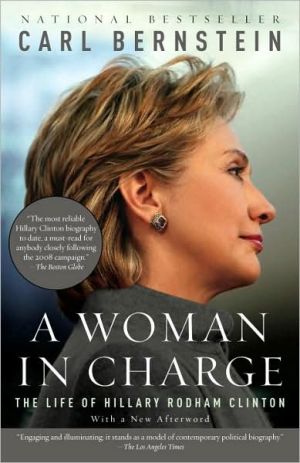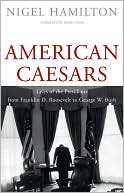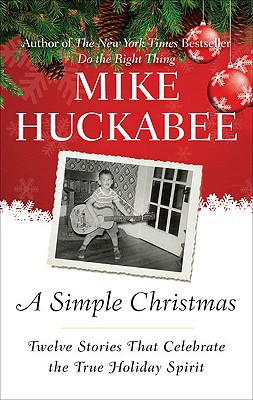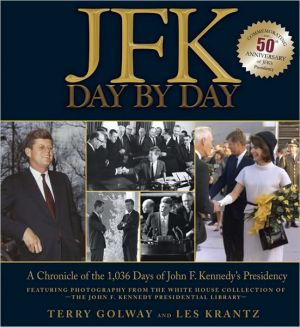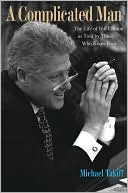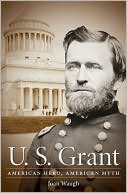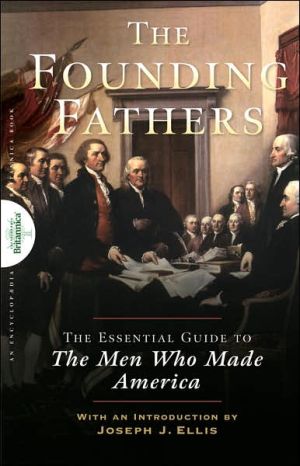A Woman in Charge: The Life of Hillary Rodham Clinton
Carl Bernstein’s stunning portrait of Hillary Rodham Clinton shows us, as nothing else has, the true trajectory of her life and career with its zigzag bursts of risks taken and safety sought. Marshaling all the skills and energy that propelled his history-making Pulitzer Prize reporting on Watergate, Bernstein gives us the most detailed, sophisticated, comprehensive, and revealing account we have had of the complex human being and political meteor who has already helped define one presidency...
Search in google:
Carl Bernstein's stunning portrait of Hillary Rodham Clinton shows us, as nothing else has, the true trajectory of her life and career with its zigzag bursts of risks taken and safety sought. Marshaling all the skills and energy that propelled his history-making Pulitzer Prize reporting on Watergate, Bernstein gives us the most detailed, sophisticated, comprehensive, and revealing account we have had of the complex human being and political meteor who has already helped define one presidency and maywell become, herself, the woman in charge of another. We see the shaping of Hillary as a self-described "mind conservative and heart liberal"?her ostensibly idyllic Midwestern girlhood (her mother a nurturer, but her father a disciplinarian, harsher than she has acknowledged); her early development of deep religious feelings; her curiosity fueled by dedicated teachers, by exposure to Martin Luther King Jr., by the ferment of the sixties, and, above all, by a desire to change the... The New York Times - Robert Dallek Carl Bernstein presents a—balanced and convincing picture of Mrs. Clinton—He also poses the essential concerns voters will need to confront in deciding whether they will support Mrs. Clinton's 2008 candidacy.
A Woman in Charge\ The Life of Hillary Rodham Clinton \ \ By Carl Bernstein \ Knopf\ Copyright © 2007 Carl Bernstein\ All right reserved.\ ISBN: 9780375407666 \ \ \ Chapter One: Formation\ \ I adored [my father] when I was a little girl. I would eagerly watch for him from a window and run down the street to meet him on his way home after work. With his encouragement and coaching, I played baseball, football and basketball. I tried to bring home good grades to win his approval.\ –Living History\ \ Hillary Rodham’s childhood was not the suburban idyll suggested by the shaded front porch and gently sloping lawn of what was once the family home at 235 Wisner Street in Park Ridge, Illinois. In this leafy environment of postwar promise and prosperity, the Rodhams were distinctly a family of odd ducks, isolated from their neighbors by the difficult character of her father, Hugh Rodham, a sour, unfulfilled man whose children suffered his relentless, demeaning sarcasm and misanthropic inclination, endured his embarrassing parsimony, and silently accepted his humiliation and verbal abuse of their mother.\ \ Yet as harsh, provocative, and abusive as Rodham was, he and his wife, the former Dorothy Howell, imparted to their children a pervasive sense of family and love for one another that in Hillary’s case is of singular importance. When Bill Clinton and Hillary honeymooned in Acapulco in 1975, her parents and her two brothers, Hughie (Hugh Jr.) and Tony, stayed in the same hotel as the bride andgroom.\ \ Dorothy and Hugh Rodham, despite the debilitating pathology and undertow of tension in their marriage (discerned readily by visitors to their home), were assertive parents who, at mid-century, intended to convey to their children an inheritance secured by old-fashioned values and verities. They believed (and preached, in their different traditions) that with discipline, hard work, encouragement (often delivered in an unconventional manner), and enough education at home, school, and church, a child could pursue almost any dream. In the case of their only daughter, Hillary Diane, born October 26, 1947, this would pay enormous dividends, sending her into the world beyond Park Ridge with a steadiness and sense of purpose that eluded her two younger brothers. But it came at a price: Hugh imposed a patriarchal unpleasantness and ritual authoritarianism on his household, mitigated only by the distinctly modern notion that Hillary would not be limited in opportunity or skills by the fact that she was a girl.\ \ Hugh Rodham, the son of Welsh immigrants, was sullen, tight-fisted, contrarian, and given to exaggeration about his own accomplishments. Appearances of a sort were important to him: he always drove a new Lincoln or Cadillac. But he wouldn’t hesitate to spit tobacco juice through an open window. He chewed his cud habitually, voted a straight Republican ticket, and was infuriatingly slow to praise his children. “He was rougher than a corncob and gruff as could be,” an acquaintance once said. Nurturance and praise were left largely to his wife, whose intelligence and abilities he mocked and whose gentler nature he often trampled. “Don’t let the doorknob hit you in the ass on your way out,” he frequently said at the dinner table when she’d get angry and threaten to leave. She never left, but some friends and relatives were perplexed at Dorothy’s decision to stay married when her husband’s abuse seemed so unbearable.\ \ “She would never say, That’s it. I’ve had it,” said Betsy Ebeling,* Hillary’s closest childhood friend, who witnessed many contentious scenes at the Rodham dinner table. Sometimes the doorknob remark would break the tension and everybody would laugh. But not always. By the time Hillary had reached her teens, her father seemed defined by his mean edges–he had almost no recognizable enthusiasms or pretense to lightness as he descended into continuous bullying, ill-humor, complaint, and dejection. \ \ In fact, depression seemed to haunt the Rodham men. Hugh’s younger brother, Russell, a physician, was the “golden boy” of the three children of Hannah and Hugh Rodham Sr. of Scranton, Pennsylvania. When Russell sank into depression in 1948, his parents asked Hugh to return to Scranton to help. Only hours after his arrival, Russell tried to hang himself in the attic, and Hugh had to cut him down. Afterward, Russell went to Chicago to stay with Hugh, Dorothy, and their baby daughter in their already overcrowded one-bedroom apartment. For months, Russell received psychiatric treatment at the local Veterans Administration hospital. Eventually he moved to a dilapidated walk-up in downtown Chicago, worked as a bartender, and declined into alcoholism and deeper depression until he died, in 1962, in a fire that was caused by a lit cigarette. Hillary deeply felt her father’s pain over the tragedy, she wrote.\ \ Hugh’s older brother, Willard, regarded as the most gregarious and fun-loving of the three, never left home or married, and was employed in a patronage job for the Scranton public works department. He resolved after his mother’s death to take care of his father. He dedicated himself completely to the task for the next thirteen years, and when his father died at age eighty-six in 1965, Willard was overwhelmed by despair. He died five weeks later of a coronary thrombosis, according to the coroner’s report, though Hillary’s brother Tony said, “He died of loneliness. When my grandfather died, Uncle Willard was lost.”\ \ Hugh Rodham, himself broken of spirit, his brothers and parents dead, soon thereafter shut his business and retired. Not yet fifty-five, he continued to withdraw. Later, both of Hillary’s brothers, to varying degrees, seemed to push through adulthood in a fog of melancholia.\ \ In 1993, after Hillary’s law partner, close friend, and deputy White House counsel Vince Foster committed suicide, she approached William Styron, who had chronicled his own struggles with depression in his acclaimed book Darkness Visible. The conversation was not only about Foster’s suicide, but also touched on the depression that seemed to afflict members of Hillary’s family.\ \ Hillary’s mother, a resilient woman whose early childhood was a horror of abandonment and cruelty, was able to overcome adversity, as would her daughter. Dorothy persevered through five years of dating Hugh Rodham–during which time she worked as his secretary and suspected he was continuing a relationship with another woman–before she agreed to marry him, according to family members. She and Hugh waited another five years to have their first child. (Chelsea Clinton, too, was born in the fifth year of her parents’ marriage.)\ \ As intellectually broad-minded as her husband was incurious and uninterested, as inclined to reflection as he was to outburst, she fulfilled her lifelong goal of attending college in her late sixties (majoring in psychology), after she and her husband moved to Little Rock in 1987 to be near their daughter and grandchild. Constantly evolving and changing (like her daughter), she managed almost invariably to find a focus for her energy and satisfaction despite the dissonance of a difficult life at home. As her husband descended, she even became something of a free spirit, at turns sentimental, analytical, spiritual, and adventurous. (Her favorite movies were not those of her childhood, but The Adventures of Priscilla, Queen of the Desert–an Australian drag queen romp–and the bloody classic Pulp Fiction.) Dorothy taught classes at Sunday school (as would her daughter); Hugh didn’t go to church on Sundays, saying he’d rather pray at home.\ \ Life in the Rodham household resembled a kind of boot camp, presided over by a belittling, impossible-to-satisfy drill instructor. During World War II, as a chief petty officer in the Navy, Rodham had trained young recruits in the U.S. military’s Gene Tunney Program, a rigorous phys-ed regime based on the champion boxer’s training and self-defense techniques, and on the traditional skills of a drill sergeant. After the war, in which Hugh had been spared overseas duty and was assigned to the Great Lakes Naval Station because of a bad knee, he replicated the barracks experience in his own home, commanding loudly from his living room lounge chair (from which he rarely rose, except for dinner), barking orders, denigrating, minimizing achievements, ignoring accomplishments, raising the bar constantly for his frustrated children–“character building,” he called it.\ \ His control over the household was meant to be absolute; confronted with resistance, he turned fierce. If Hillary or one of her brothers had left the cap off a toothpaste tube, he threw it out the bathroom window and told the offending child to fetch it from the front yard evergreens, even in snow. Regardless of how windy and cold the Chicago winter night, he insisted when the family went to bed that the heat be turned off until morning. At dinner, he growled his opinions, indulged few challenges to his provocations, and rarely acknowledged the possibility of being proved wrong. Still, Hillary would argue back if the subject was substantive and she thought she was right. If Dorothy attempted to bring a conflicting set of facts into the discussion, she was typically ridiculed by her husband: “How would you know?” “Where did you ever come up with such a stupid idea?” “Miss Smarty Pants.”\ \ “My father was confrontational, completely and utterly so,” Hugh Jr. said. Decades later, Hillary and her brothers suggested this was part of a grander scheme to ensure that his children were “competitive, scrappy fighters,” to “empower” them, to foster “pragmatic competitiveness” without putting them down, to induce elements of “realism” into the privileged lifestyle of Park Ridge. Her father would tepidly acknowledge her good work, but tell her she could do better, Hillary said. But there is little to suggest that she or her brothers interpreted such encouragement so benignly at the time. When Hillary came home with all As except for one B on her report card, her father suggested that perhaps her school was too easy, and wondered half-seriously why she hadn’t gotten straight As. Hillary tried mightily to extract some unequivocal declaration of approval from her father, but he had tremendous difficulty in expressing pride or affection.\ \ At the dinner table, Betsy Ebeling recalled, “Hillary’s mom would have cooked something good, and her dad would throw out a conversation topic, almost like a glove on the table, and he would always say something the opposite of what I thought he really believed–because it was so completely provocative and outrageous. It was just his way. He was opinionated, and he could be loud, and what better place to [be that way] than in his own home?”\ \ Unleashed, his rage was frightening, and the household sometimes seemed on the verge of imploding. Betsy and the few other girlfriends whom Hillary brought home could see that life with Hugh Rodham was painfully demeaning for her mother, and that Hillary winced at her father’s distemper and chafed under his miserliness. Money was always a contentious issue, ultimately the way in which he could exercise undisputed control, especially in response to Hillary’s and Dorothy’s instinctive rebelliousness and the wicked sense of humor they shared. \ \ Sometimes his tirades would begin in the kitchen and continue into her parents’ bedroom. Hillary would put her hands over her ears. But the experience of standing up to her father also prepared her for the intellectual rough-and-tumble that honed Hillary and Bill Clinton’s marital partnership, and helped inure her in the arena of political combat.\ \ “I could go home to two parents who adored everything I did,” said Betsy. “Hillary had a different kind of love; you had to earn it.”\ \ \ \ * Ebeling is Betsy’s married name. Her maiden name was Johnson. \ \ Continues... \ \ \ \ Excerpted from A Woman in Charge by Carl Bernstein Copyright © 2007 by Carl Bernstein. Excerpted by permission.\ All rights reserved. No part of this excerpt may be reproduced or reprinted without permission in writing from the publisher.\ Excerpts are provided by Dial-A-Book Inc. solely for the personal use of visitors to this web site. \ \
Prologue 9Formation 23A Young Woman on Her Own 66Love and War at Yale 104Making Arkansas Home 149The Prize 320A Transitional Woman 350Inauguration 380Settling In 406Portrait of a First Lady 442A Downhill Path 460Health Care 471The Politics of Meaning...and Family 489The Cruel Season 506Not a Crook, Not a Degenerate 576Truth or Consequences 622Truth or Consequences (2) 709The Longest Season 801A Woman in Charge 889A Note on Sources 917Notes 928Bibliography 1014Acknowledgments 1036
\ Los Angeles TimesBernstein almost always finds new facts and telling details . . . [His] account benefits enormously from remarkably candid on-the-record assessments of both Clintons by intimates such as close friend Jim Blair and Betsey Wright, Clinton's gubernatorial chief of staff in Arkansas.\ —Ronald Brownstein\ \ \ \ \ Boston GlobeWith admirable judiciousness and fastidious research, Bernstein explains everything about Hillary's rise. A Woman in Charge, in fact, is the most reliable Hillary Clinton biography to date, a must-read for anybody closely following the 2008 campaign.\ &3151;Douglas Brinkley\ \ \ Chicago Sun-TimesHillary Clinton is somebody you think you know... which makes Carl Bernstein's new bio, A Woman in Charge, so surprising. Fresh, complete and detailed, it offers a welcome chance to recalibrate our gauges on her. You already know it's quite a story, but Bernstein fleshes it out as never before. He takes us from the hallways of Park Ridge's Maine East High School (where the yearbook wags called her Sister Frigidaire) to the intimate awkwardness of the White House family quarters as Monicagate descends. Bernstein, the famed All the President's Men journalist, is dead solid perfect in his reporting here . . . The detail and digging on display in A Woman in Charge is stunning.\ —John Barron\ \ \ \ \ The EconomistSerious, well-researched and fair . . . A Woman in Charge is . . . painstaking, sensitive and elegantly written.\ \ \ \ \ The Wall Street JournalA remarkably revealing portrait.\ —Byron York\ \ \ \ \ The New York TimesCarl Bernstein presents a . . . balanced and convincing picture of Mrs. Clinton . . . He also poses the essential concerns voters will need to confront in deciding whether they will support Mrs. Clinton's 2008 candidacy.\ &3151;Robert Dallek\ \ \ \ \ Christian Science MonitorThis book is really a considerable achievement.\ &3151;Peter Grier\ \ \ \ \ Robert DallekCarl Bernstein presents a—balanced and convincing picture of Mrs. Clinton—He also poses the essential concerns voters will need to confront in deciding whether they will support Mrs. Clinton's 2008 candidacy.\ —The New York Times\ \ \ \ \ Jennifer SeniorWhile he plows some of the same emotional terrain as previous Hillary biographers—notably Gail Sheehy in Hillary's Choice—his book holds together as a piece of writing, and he keeps the psychobabble to a merciful minimum. He also attempts to write a genuine biography, describing and interpreting the life Hillary has led and the varieties of forces that shaped her.\ —The New York Times Book Review\ \ \ \ \ Kirkus ReviewsA layered, thoughtful, critical biography of the woman who, at this writing, seems poised to become the 44th president of the United States. Hillary Clinton, to read between of-Watergate-fame Bernstein's (Loyalties: A Son's Memoir, 1991, etc.) lines, is a political cyborg, clinically devoted to remaking her image in order to appear to best political advantage, quick to shed ideology for expedience. Many of those who knew her in the White House, as first lady, consider her intellectually outclassed by her foxy husband, himself no stranger to image-remaking and self-serving expedience; her strengths there lay in organization and hard work, not in dazzling displays of dialectic. Bernstein lays many of her husband's failures, but not failings, at her door, "not just her botched handling of their health care agenda, or the ethical cloud hovering like a pall over their administration, but so many of the stumbles and falls responsible for sweeping in the Congress led by Newt Gingrich in 1994 and ending the ambitious phase of their presidency." A vast right-wing conspiracy faces Hillary, to be sure. It always has, beginning with her father, hypercritical and oppressive; happily, Bernstein resists the temptation to practice psychobiography without a license, but the influence on her adult life seems fairly clear even without such commentary. (Welfare reform? Tell it to a father who refused to give her an allowance because she already ate and slept for free.) Bernstein attributes to Clinton, too, a rather grim ethic of salvation through work, and he well documents her essential conservatism and humorlessness; the spice in all that is the thought that it is her job to save her husband from himself,despising his weakness all the while, even as the two formed "a single, intertwined governmental and martial power," one that may continue after a Bush interregnum. And as to Vince Foster, and Whitewater, and rumors of Sapphic revels, and vengeful calculation, and overweening ambition? Never fear: They're all to be found in Bernstein's revealing, admiring, often surprising book. First printing of 350,000\ \
